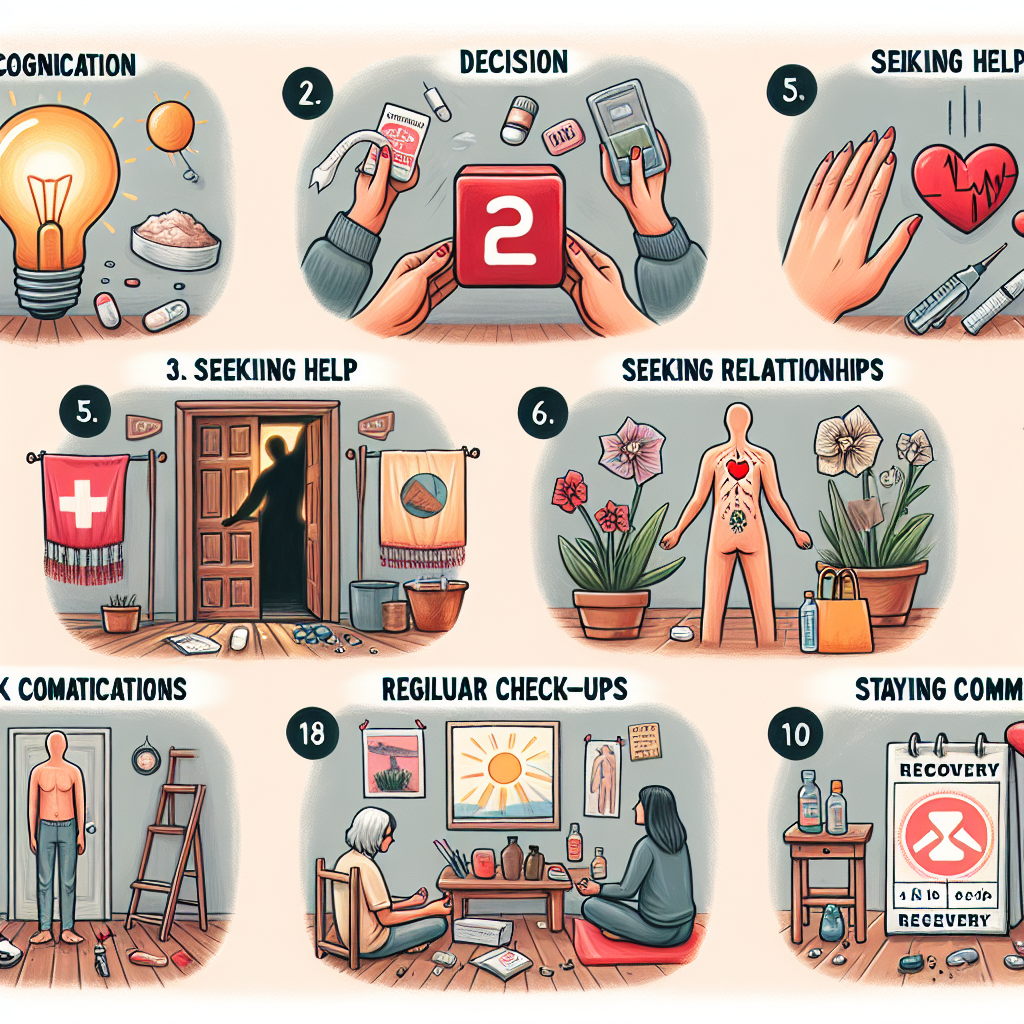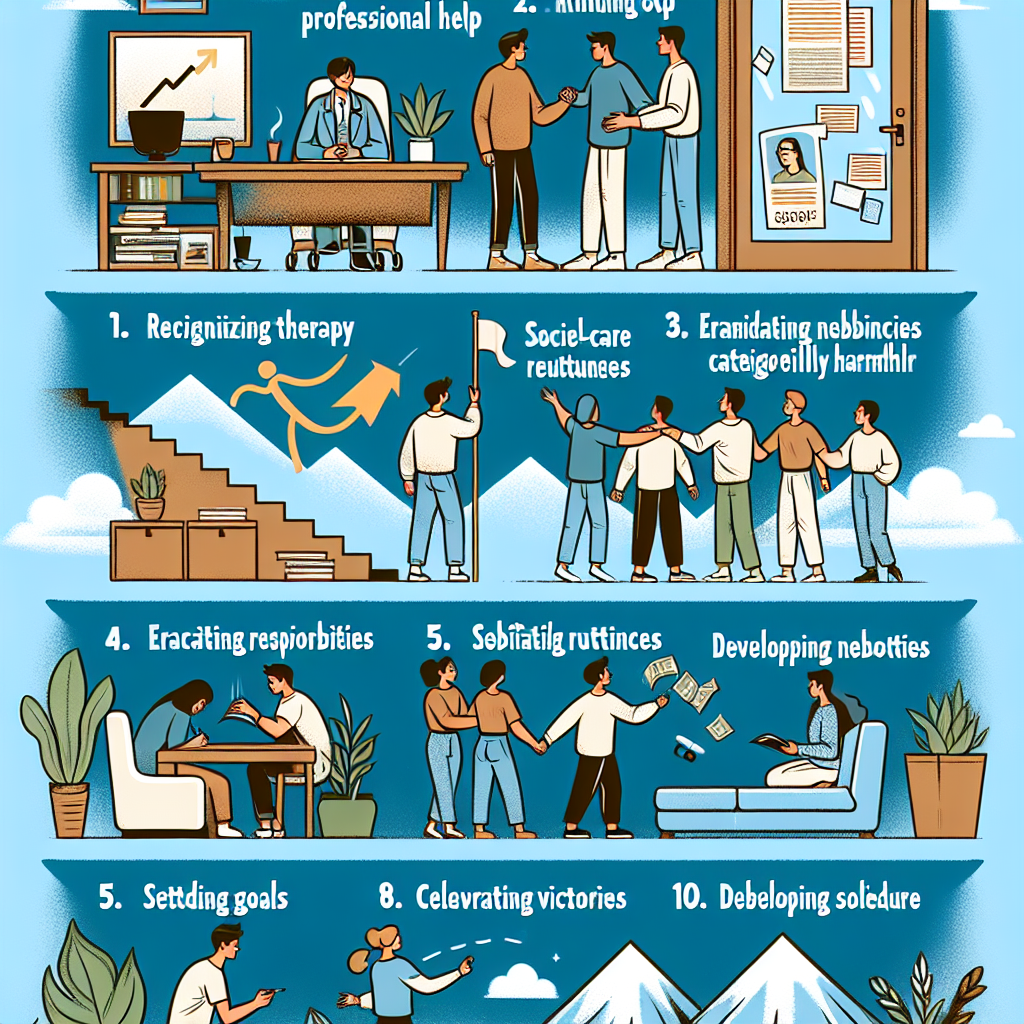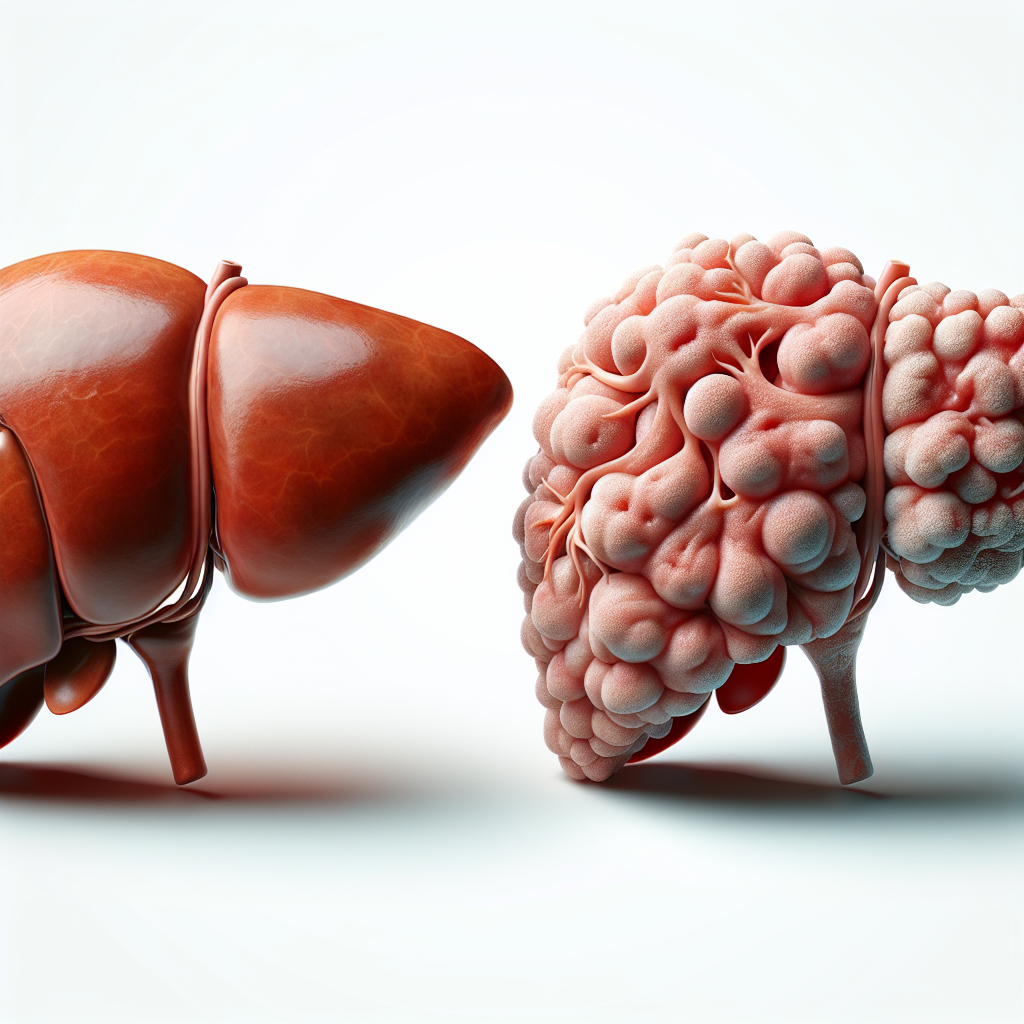Table of Contents
Introduction
Starting the journey to recovery from drug addiction is a courageous and transformative decision. It requires a structured approach, commitment, and support. Here are 10 essential steps to guide you through this challenging yet rewarding process. These steps encompass acknowledging the problem, seeking professional help, building a support network, and adopting healthy lifestyle changes. By following these steps, you can pave the way towards a healthier, drug-free life and reclaim control over your future.
10 Essential Steps to Begin Your Drug Addiction Recovery Journey
Embarking on the journey to recovery from drug addiction is a courageous and transformative decision. It is a path that requires determination, support, and a clear plan. To help you navigate this challenging yet rewarding journey, here are ten essential steps to begin your recovery.
First and foremost, acknowledging the problem is crucial. Admitting that you have a drug addiction and recognizing its impact on your life is the foundation of your recovery. This self-awareness is the first step towards change, as it allows you to confront the issue head-on and commit to overcoming it.
Once you have acknowledged the problem, the next step is to seek professional help. Addiction is a complex condition that often requires medical and psychological intervention. Consulting with healthcare professionals, such as doctors, therapists, or addiction specialists, can provide you with a comprehensive assessment and a tailored treatment plan. These experts can guide you through detoxification, therapy, and other necessary treatments.
In addition to professional help, building a strong support system is essential. Surrounding yourself with supportive friends, family members, and peers who understand your struggle can provide emotional strength and encouragement. Support groups, such as Narcotics Anonymous, offer a sense of community and shared experiences, which can be incredibly motivating.
Setting realistic goals is another important step in your recovery journey. Breaking down your recovery into manageable milestones can make the process less overwhelming. Celebrate small victories along the way, as these achievements can boost your confidence and reinforce your commitment to staying drug-free.
Furthermore, developing healthy coping mechanisms is vital. Many individuals turn to drugs as a way to cope with stress, anxiety, or other emotional challenges. Learning alternative strategies, such as mindfulness, exercise, or creative outlets, can help you manage these feelings without resorting to substance use.
Equally important is making lifestyle changes that support your recovery. This may involve altering your daily routine, avoiding triggers, and creating a drug-free environment. Engaging in activities that promote physical and mental well-being, such as regular exercise, balanced nutrition, and sufficient sleep, can enhance your overall health and resilience.
Education plays a significant role in recovery as well. Understanding the nature of addiction, its effects on the brain and body, and the potential for relapse can empower you to make informed decisions. Knowledge about addiction can also help you recognize warning signs and take proactive steps to prevent setbacks.
Moreover, practicing self-compassion is essential throughout your recovery journey. Addiction often comes with feelings of guilt and shame, but it is important to treat yourself with kindness and forgiveness. Acknowledge your progress and remind yourself that recovery is a gradual process that requires patience and perseverance.
As you progress, staying committed to your recovery plan is crucial. Consistency in attending therapy sessions, support group meetings, and following your treatment plan can significantly increase your chances of long-term success. Remember that recovery is not a linear path; there may be setbacks, but staying committed will help you overcome them.
Lastly, envisioning a positive future can be a powerful motivator. Visualize the life you want to lead without drugs, and set long-term goals that align with this vision. Whether it’s pursuing a career, rebuilding relationships, or exploring new hobbies, having a clear picture of your desired future can inspire you to stay on track.
In conclusion, starting your journey to recovery from drug addiction involves a series of deliberate and supportive steps. By acknowledging the problem, seeking professional help, building a support system, setting realistic goals, developing healthy coping mechanisms, making lifestyle changes, educating yourself, practicing self-compassion, staying committed, and envisioning a positive future, you can pave the way to a healthier, drug-free life. Remember, every step you take brings you closer to the person you aspire to be.
Starting Your Path to Sobriety: 10 Crucial Steps for Overcoming Drug Addiction

Embarking on the journey to recovery from drug addiction is a courageous and transformative decision. It is a path that requires determination, support, and a clear plan. To help you navigate this challenging yet rewarding journey, here are ten crucial steps to guide you toward sobriety.
First and foremost, acknowledging the problem is the initial and most vital step. Admitting that you have a drug addiction and recognizing its impact on your life is essential. This self-awareness lays the foundation for your recovery journey, as it opens the door to seeking help and making necessary changes.
Once you have acknowledged the problem, the next step is to seek professional help. Consulting with healthcare professionals, such as doctors, therapists, or addiction specialists, can provide you with a comprehensive understanding of your addiction and the available treatment options. These experts can help you develop a personalized recovery plan tailored to your specific needs.
In addition to professional help, building a strong support system is crucial. Surrounding yourself with supportive friends, family members, or support groups can provide the encouragement and accountability needed to stay on track. Sharing your struggles and successes with others who understand your journey can be incredibly empowering and motivating.
Another important step is to educate yourself about addiction and recovery. Understanding the nature of addiction, its triggers, and the recovery process can help you make informed decisions and anticipate challenges. Knowledge is a powerful tool that can equip you with the skills and strategies needed to overcome obstacles.
Setting realistic and achievable goals is also essential in your recovery journey. Break down your long-term goal of sobriety into smaller, manageable steps. Celebrate each milestone, no matter how small, as it signifies progress and reinforces your commitment to recovery.
Developing healthy coping mechanisms is another critical step. Identify activities or practices that can help you manage stress, anxiety, or cravings without resorting to drugs. This could include exercise, meditation, hobbies, or spending time with loved ones. Healthy coping mechanisms can provide a positive outlet for your emotions and reduce the risk of relapse.
Furthermore, making lifestyle changes is necessary to support your recovery. This may involve avoiding environments or people that trigger your drug use, establishing a routine, and prioritizing self-care. Creating a balanced and healthy lifestyle can reinforce your commitment to sobriety and enhance your overall well-being.
Another key step is to stay committed to your treatment plan. Whether it involves therapy, medication, or support groups, adhering to your treatment plan is crucial for long-term recovery. Consistency and dedication to your treatment can help you build resilience and maintain sobriety.
Additionally, practicing self-compassion is vital throughout your recovery journey. Understand that setbacks may occur, and it is important to treat yourself with kindness and patience. Learn from any relapses and use them as opportunities for growth and improvement.
Finally, giving back to others can be a powerful motivator in your recovery. Helping others who are struggling with addiction can provide a sense of purpose and fulfillment. It can also reinforce your commitment to sobriety and remind you of how far you have come.
In conclusion, starting your path to sobriety involves a series of crucial steps that require determination, support, and self-awareness. By acknowledging the problem, seeking professional help, building a support system, educating yourself, setting realistic goals, developing healthy coping mechanisms, making lifestyle changes, staying committed to your treatment plan, practicing self-compassion, and giving back to others, you can overcome drug addiction and embark on a fulfilling journey to recovery. Remember, each step you take brings you closer to a healthier, happier, and drug-free life.
A Comprehensive Guide: 10 Steps to Kickstart Your Recovery from Drug Addiction
Embarking on the journey to recovery from drug addiction is a courageous and transformative decision. It is a path that requires determination, support, and a clear plan. To help you navigate this challenging yet rewarding journey, here are ten essential steps to kickstart your recovery from drug addiction.
First and foremost, acknowledging the problem is a crucial initial step. Admitting that you have a substance abuse issue is not a sign of weakness but a powerful act of self-awareness and honesty. This acknowledgment sets the foundation for your recovery journey, allowing you to confront the problem head-on.
Following this, seeking professional help is vital. Addiction is a complex condition that often requires medical and psychological intervention. Consulting with healthcare professionals, such as doctors, therapists, or addiction specialists, can provide you with a comprehensive assessment and a tailored treatment plan. These experts can guide you through detoxification, therapy, and medication management if necessary.
In addition to professional help, building a strong support network is essential. Surrounding yourself with understanding and supportive individuals can make a significant difference in your recovery process. This network can include family, friends, support groups, or even online communities. Sharing your experiences and challenges with others who understand can provide emotional support and encouragement.
Moreover, setting realistic and achievable goals is a key component of recovery. Breaking down your recovery journey into smaller, manageable steps can make the process less overwhelming. Celebrate each milestone, no matter how small, as it signifies progress and reinforces your commitment to recovery.
Another important step is to develop healthy coping mechanisms. Addiction often stems from an attempt to cope with stress, trauma, or emotional pain. Learning new, healthier ways to manage these feelings is crucial. Techniques such as mindfulness, meditation, exercise, and engaging in hobbies can provide positive outlets for your emotions.
Furthermore, making lifestyle changes can significantly impact your recovery. This may involve altering your daily routine, avoiding triggers, and creating a drug-free environment. Establishing a structured and healthy lifestyle can help you maintain focus and reduce the risk of relapse.
Education is also a powerful tool in your recovery arsenal. Understanding the nature of addiction, its effects on your body and mind, and the various treatment options available can empower you to make informed decisions about your recovery. Knowledge can also help you recognize and address potential challenges before they become obstacles.
Additionally, practicing self-compassion is essential throughout your recovery journey. It is important to be kind to yourself and recognize that setbacks are a natural part of the process. Instead of viewing them as failures, see them as opportunities to learn and grow stronger. Self-compassion fosters resilience and helps you stay motivated.
Engaging in therapy or counseling can provide deeper insights into the underlying causes of your addiction. Therapists can help you explore past traumas, unresolved issues, and negative thought patterns that may contribute to your substance abuse. Through therapy, you can develop healthier thought processes and behaviors.
Lastly, staying committed to your recovery is paramount. Recovery is a lifelong journey that requires ongoing effort and dedication. Regularly attending support group meetings, continuing therapy, and staying connected with your support network can help you maintain your progress and prevent relapse.
In conclusion, starting your journey to recovery from drug addiction involves a series of deliberate and compassionate steps. By acknowledging the problem, seeking professional help, building a support network, setting goals, developing coping mechanisms, making lifestyle changes, educating yourself, practicing self-compassion, engaging in therapy, and staying committed, you can pave the way to a healthier, drug-free life. Remember, every step you take brings you closer to the life you deserve.
Conclusion
Starting your journey to recovery from drug addiction involves a series of crucial steps: acknowledging the problem, seeking professional help, building a support network, setting realistic goals, developing a treatment plan, addressing underlying issues, adopting healthy habits, avoiding triggers, staying committed, and celebrating progress. Each step is essential in creating a sustainable path to sobriety and overall well-being.



